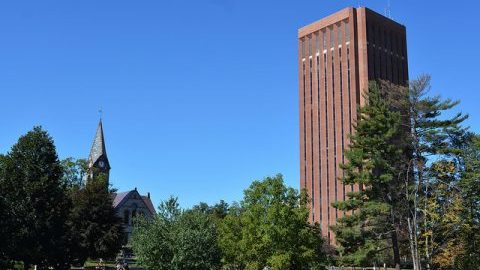Adding to the abundance of bicyclists at the University of Massachusetts, ValleyBike Share, a community driven bike-share program, officially rolled out on campus this past June.
With over 500 bikes scattered across 50 stations that range from Springfield to Amherst, riders can pay to grab an electric-assist bicycle from any ValleyBike dock as long as they return it to another station in the network when finished.
“ValleyBike Share is very easy to use,” UMass campus sustainability manager Ezra Small said. “You can just take a bike and unlock it and everything is automated. It logs all of your usage, every rental and how long you use it for. The bike technology is amazing.”
Currently, four stations on campus are fully operational. Students can access ValleyBike at Knowlton Hall, Haigis Mall, in Southwest and near Greenough. A fifth station, located in front of the Integrative Learning Center, will be completed in the coming weeks.
The bikes are electric-assist, which gives bikers an extra boost of speed through a small motor when riding. Kiosks are open 24/7 and are fully autonomous — all that is needed to check out a bike is an account or a membership card, which can be done either on the ValleyBike smartphone app or on the service’s website.
Funded by a $1.3 million federal Congestion Mitigation and Air Quality grant, UMass joined the Pioneer Valley Planning Commission and the cities of Northampton, Springfield, Amherst, Holyoke and South Hadley in collaboration on ValleyBike.
“Four years ago, I was approached by the PVPC and the town of Amherst asking if UMass wanted to be involved,” Small said. “We’re a large enough entity and we have such a large impact on the overall operations and congestion in the valley, so I felt like UMass should be at the table not as a tertiary sponsor level, but on a decision-making level.”
Small said that the fact that the bikes are electric-assist gives people a sustainable alternative to usual forms of transportation. With bikes more readily available, commuters might be more inclined to use bikes in place of their cars, he said.
“Electric-assist targets not only the conventional bike rider, but it also expands the demographics of people who can use our bikes,” Small explained.
Since Northampton was charged with overseeing the federal grant, Wayne Feiden, Northampton’s director of planning and sustainability, was tasked with a leading role on ValleyBike. Considering UMass as its own entity during preliminary talks was essential to the success of the program, he said.
“UMass is a population that is just more likely to ride,” Feiden said. “And it’s not just students, it’s faculty and staff too. In essence, it mirrors our entire demographic.”
In addition to the five docks planned on campus, five more docks are available in the town of Amherst. According to Small, a wide selection of docks will most likely encourage heavy “pocket usage,” which are shorter trips made within a certain radius.
ValleyBike has seen a tremendous amount of usage since its summer debut. According to ValleyBike’s website, 707 active members have made over 26,000 trips, for a total of over 50,000 miles traveled.
But the system has not been without its hiccups. Christine Brestrup, director of planning for the town of Amherst, said that there has been trouble with the electric assist on some bikes.
“Some people were finding that they would ride a certain distance and the electric assist wouldn’t work anymore,” Brestrup said. “It’s an intermittent problem, it’s here and there and not everywhere. Difficulties like this are to be expected.”
ValleyBike isn’t the first bike-rental program at UMass. In 2011, the Student Government Association, along with the university’s Physical Plant, began a “bike library” program that allows anyone with a UCard to borrow a bike for up to 24 hours.
Small said this program still exists, though a lack of resources and increasing damage to rented bikes have put a damper on its effectiveness.
“There have been a lot of challenges with that program, and I think we’re in agreement that we will take the bikes in the old bike share program and make it a more long-term rental program,” Small said. “I’m thankful for them for running that program but I think it’s in the best interest to start transitioning into a long-term program.”
Since the semester began, students have been spotted riding the white and blue bikes all across campus. One of those students, Jonah Ogburn, a senior political science and operations and information management major, has been using the program daily since he moved in.
“The bus is often crowded, and depending on where I am specifically going in town or on campus, the bike will get me a lot closer to my final destination,” Ogburn said. “Walking has its place, but having biking as an option helps me get to places on time.”
Tomas Lajara, a sophomore majoring in biochemistry and molecular biology, has been using the system all summer in Springfield and was elated to see it on campus.
“The bikes are more reliable and faster than waiting for a bus,” Lajara said. “You just grab and go with nothing really stopping you.”
ValleyBike memberships are $2 for a single ride, $6 for a day-pass, $20 for a monthly pass and $80 for a year.
Email Michael at [email protected] follow him on Twitter @mikepconnors.




















